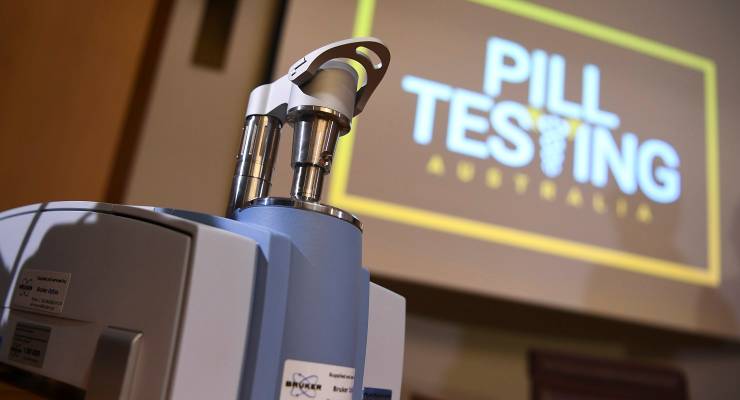
Australia’s two most populous states are yet to commit to offering drug testing services, despite calls by experts, advocates and coroners to do so.
NSW Health Minister Ryan Park told Crikey he wasn’t personally convinced pill testing services should be offered in the state, but said an upcoming drug summit would look at reform “across the board”.
“It’s one of the measures, but it’s not the only measure — everyone who works in these spaces will tell you there are a range of different measures,” Park told Crikey on Monday.
Park’s comments come after two men aged in their 20s died of suspected overdoses at a music festival in Sydney at the weekend.
Victoria likewise hasn’t committed to offering drug testing, even though the state coroner recommended introducing the services last month.
State Coroner Judge John Cain recommended at the beginning of September that the state government “implement a drug checking service in the state of Victoria to minimise the risks and the number of preventable deaths associated with the use of drugs obtained from unregulated drug markets”.
Victorian Health Department secretary Euan Wallace acknowledged such a service “can provide information in support of reducing drug-related harms”, but declined to support the recommendation, according to The Age.
“However, there are no current plans to implement a drug checking service of the kind you have recommended in your findings,” Wallace was quoted as saying.
A Victorian government spokesperson told Crikey: “Any drug-related death is a tragedy, and we send our deepest condolences to the families and loved ones affected. There are no current plans to trial pill testing.”
The ACT has established a permanent drug testing centre located in Canberra’s CBD, known as CanTEST. The service opened in mid-2022.
An evaluation of the service’s first six months of operation found more than half of the drugs tested were not what the user had expected.
One in 10 samples were discarded on-site once the user found out what was actually in the drugs, the Australian National University said in its independent evaluation of the service.
“CanTEST is helping to change people’s drug behaviours. Service data shows that some clients decide not to take the drugs after they receive information about them, or they use the harm reduction advice to reduce their risks if they do go on to take the substance,” evaluation lead author associate professor Dr Anna Olsen said in a statement in July.
“For example, when the substance was not what the user expected, one in three clients reported they would not use the drug.”
Queensland, too, is on track to offer drug testing services.
Last month, the state’s government invited providers to bid for a tender to operate two fixed drug-checking sites and a mobile service for music and sporting events, The Brisbane Times reported.
“We need to be clear — this is a harm minimisation measure, not a law-and-order campaign. We are doing this to try to protect all Queenslanders from the dangerous effects of illicit drugs,” Queensland Health Minister Shannon Fentiman said, adding the state had looked at the results from the ACT when evaluating the services.
The NSW government has been criticised for delaying action on drug testing services until the planned drug summit. A 2019 coroner’s report into six drug-related deaths at festivals recommended pill testing services, and a special commission known as the Ice Inquiry, published in 2020, also recommended the services.
Asked by Crikey why the recommendations from the inquiry weren’t enough to convince the NSW government of the need for testing services, Park said he’d await the outcome of the drug summit.
“The drug summit will be a bit more of a whole-of-government perspective, it will look at drug legislation and reform across the board,” he said.
“The summit will happen sometime next year — we haven’t locked in a date yet, but it’ll look at an arrangement for these issues.”
Sam Kidd, campaigns director at the drug safety charity Unharm, said state governments should move quickly to allow pill testing services in order to save lives.
“There is no reason we have to wait until we have another summit — delaying is not going to do anything to keep people safe and prevent further tragedies this summer,” Kidd told Crikey.
“I think governments around the country are kind of looking at this issue through a very political lens, and they don’t necessarily see it as something that’s going to win them votes — they are, in a way, playing political games with people’s lives by not implementing what is a proven and effective health response to help people stay safe when they’re taking drugs.”
Kidd said there are numerous countries around the world, including New Zealand, where testing was legal. He said he didn’t think it would be realistic to expect people to simply stop taking drugs — rather, officials should ensure those who do use drugs can do so safely.
“The nature of drugs being illegal means that people are buying them from sources that themselves might not even know what’s really in them,” he said.
“I think the idea that we can just have cops and sniffer dogs and tell people not to take drugs is just ridiculous, it’s out of touch with reality.”








I was disappointed Alex Wodak on News Breakfast this morning said he had ‘no idea’ why NSW refused to implement pill testing. What he should have said, when asked why NSW Govt refused, was ‘Chris Minns is terrified of the consequences if he allowed pill testing and somebody still died at one of these events.’
The appropriate response to that is ‘Grow up Premier. People will continue to take drugs whether you implement pill testing or not. But a lot fewer people will die if pill testing is allowed. Nobody can guarantee that there will be no deaths from reactions to illicit drugs. But as long as this is viewed as a law and order issue and not a health issue, more people will die.’
Agreed Mercurial,
MDMA is one of the safer commonly used illegal drugs. By far the biggest safety issue is adulterants added during illegal manufacturing of the drug, but even pharmaceutical grade MDMA can kill some individuals in rare cases*.
It makes no sense that me and my peers can, if we choose, legally buy and knock ourselves out on alcohol every day of the week, despite all the known health risks, including death from liver disease and several cancers, but MDMA fanciers cannot buy the drug legally, let alone in an unadulterated form at a known dosage. (I’d suggest it should only be available on prescription, and only after the recipient had passed a course where all the negatives were laid out and clearly explained.)
Freedom of the individual to choose in the case of alcohol, but not in the case of MDMA, and say, cannabis, is illogical and unjust.
Drug prohibition using severe law enforcement has been tried. It doesn’t work. The definition of madness is to keep doing the same thing and expecting a different result.
*https://www.nytimes.com/2023/08/18/well/mind/mdma-ecstasy-risk.html
Hey Minns, No Guts No Glory!
So far NSW labor would rather have kids die than change do the right thing. Pathetic.
This is representative of our times ‘he wasn’t personally convinced pill testing services should be offered in the state’
Health, medical etc. science is now a matter of personal opinion and beliefs, like climate, Covid science etc.?
Riddle me this:
– some of the biggest consumers of drugs are politicians, and people in media; and
– politicians are too afraid of certain sections of the media to introduce sensible drugs policies….
Follow the money is usually a wise strategy.
Time for removal of drug policy from the law and order brigade and move it to an issue of health. Legalise and introduce quality control with appropriate excise. Look at the Portuguese experience with decriminalisation over several decades. Make any offence the same as alcohol:prohibition of operating machinery by having the drug in your system at prescribed levels if the drug diminishes performance like alcohol. Savings in policing can be redirected to crackdowns on white collar crime!